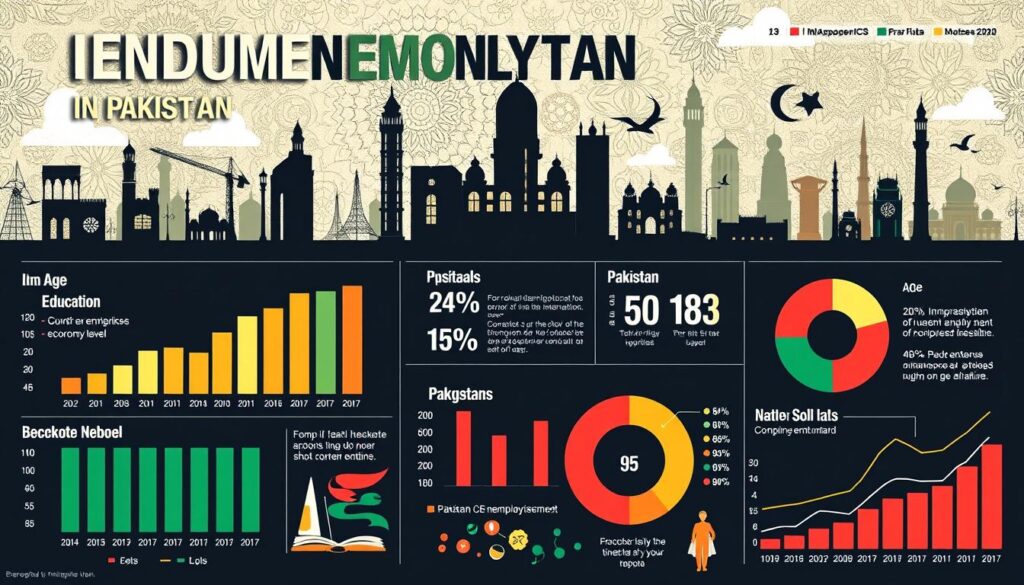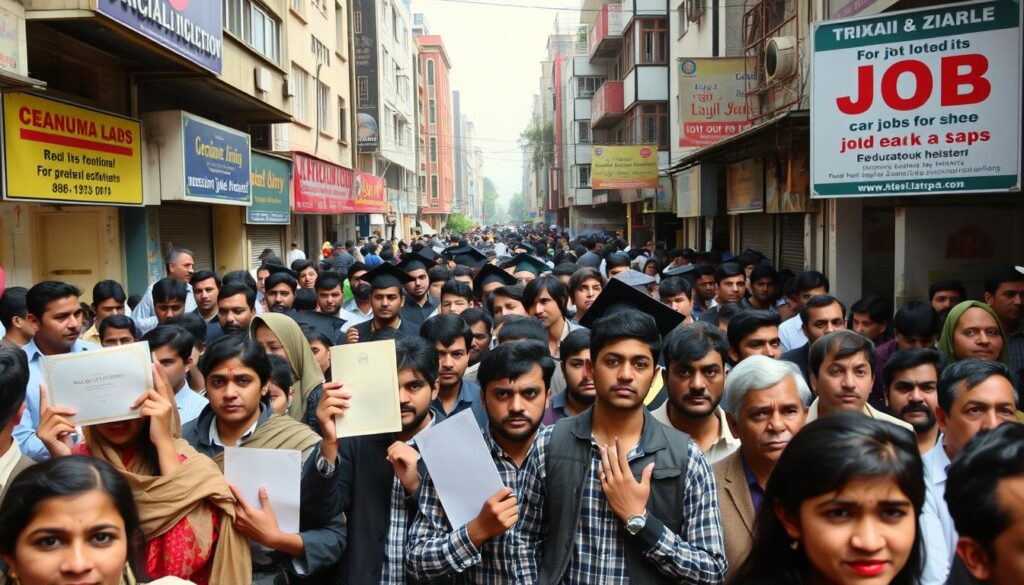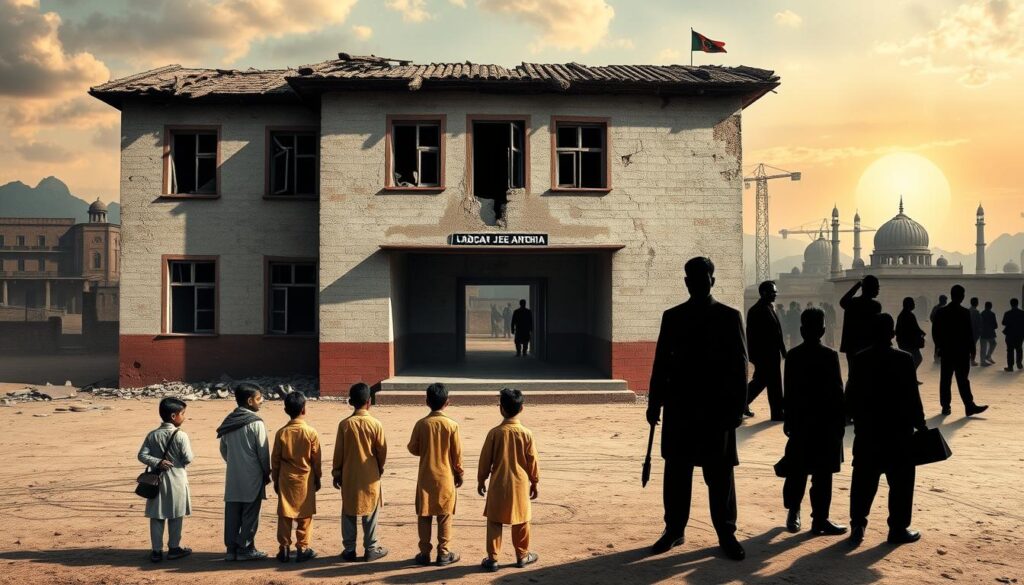Pakistan’s job market is facing a big challenge. The country has high unemployment rates, especially among young people. A recent report by the Planning Commission shows that many graduates are not finding jobs.
This has led many skilled individuals to look for work abroad. The gap between what schools teach and what employers need is a major problem. This issue is causing a brain drain, which hurts the economy.
To fix this, it’s important to connect education with jobs. This is key for Pakistan’s economic growth and the happiness of its people.
Key Takeaways
- Pakistan’s job market faces a critical challenge with high unemployment rates, particularly among the youth.
- The country’s education system produces highly skilled graduates but fails to provide them with meaningful employment opportunities.
- The disconnect between the curriculum and industry needs has fueled the unemployment crisis, leading to brain drain.
- Bridging the gap between education and employment is crucial for Pakistan’s economic development.
- Addressing the workforce crisis and creating more job opportunities is a pressing issue for Pakistan’s policymakers.
The Stark Reality of Unemployment in Pakistan
Pakistan’s job market is facing a tough reality. The country has seen unemployment rates over 7% in recent years. This paints a grim picture of the nation’s labor force participation.
The youth unemployment rate is especially concerning. It’s over 15% for those aged 15-24. This data shows the urgent need to create more job opportunities for the younger generation.
Statistics Unveiling the Gravity of the Situation
The latest unemployment statistics in Pakistan show a consistent high joblessness rate. The labor force participation in Pakistan is struggling to keep up with the growing population.
Urban vs. Rural Unemployment Disparities
The urban-rural unemployment gap in Pakistan is alarming. Urban areas have higher joblessness rates because most jobs are in major cities. This imbalance shows the need for a comprehensive approach to address regional disparities and ensure jobs are available everywhere.
“The stark reality of Pakistan’s unemployment crisis highlights the urgent need for comprehensive solutions to address this multifaceted challenge.”
The youth unemployment rate in Pakistan adds to the problem. Young graduates find it hard to move from education to real jobs. A multifaceted approach is needed to bridge the gap between workforce skills and labor market demands.

Unemployment in Pakistan: A Multifaceted Challenge
Pakistan’s unemployment crisis is complex, with many factors at play. The causes of unemployment in pakistan include a gap between education and jobs, lack of skill development, and economic issues. These problems lead to slow growth and fewer jobs.
The mismatch between education and job needs is a big problem. This means many graduates can’t find jobs. This issue worsens the economic and social impact of unemployment in pakistan.
Also, some jobs are seen as less important, like teaching. This makes people less likely to choose these careers. This is bad for the country’s workforce.
“Addressing the unemployment crisis in Pakistan requires a comprehensive approach that tackles the root causes and fosters collaboration between various stakeholders.”
To solve unemployment, we need a wide-ranging plan. This includes better skill training, education that meets job needs, and valuing all jobs. By doing this, Pakistan can have a better job market for everyone.

Fixing Pakistan’s job market problems needs everyone to work together. The government, schools, and businesses must join forces. This way, Pakistan can use its workforce to its fullest potential and improve the future for its people.
Education System’s Role in Fueling Joblessness
Pakistan’s education system plays a big role in the country’s joblessness problem. The gap between what schools teach and what employers want has left many graduates unprepared. This mismatch means many can’t find jobs that match their skills.
Disconnect Between Curriculum and Industry Needs
Pakistan’s schools often don’t teach the skills needed in today’s job market. The curriculum doesn’t keep up with new technologies and business needs. This leaves students without the skills they need to get jobs.
- Outdated curriculum that fails to address industry demands
- Insufficient focus on practical, hands-on training and problem-solving skills
- Limited collaboration between academia and the private sector
The mismatch between education and the job market in Pakistan has led to a growing pool of educated, yet unemployed, individuals, highlighting the urgent need for curriculum reform and stronger ties between the education system and industry.
To solve this, we need a big change. We must make school curricula match what employers want. We also need to work closer with businesses. This way, Pakistan’s young people can get the skills they need to succeed and help solve the job crisis.

Economic Repercussions of Youth Unemployment
Youth unemployment in Pakistan has serious economic effects. It leads to a problem called brain drain. Talented graduates can’t find jobs in Pakistan and move abroad. This means Pakistan loses its valuable human capital.
This brain drain hurts Pakistan’s economic growth. It also stops industries from growing because they lack skilled workers. As skilled workers leave, Pakistan’s talent pool migration becomes a big worry. It affects the country’s long-term economic future.
Brain Drain: Talented Graduates Seeking Opportunities Abroad
The effects of youth unemployment in Pakistan go beyond individual problems. Skilled workers, especially recent graduates, often look for jobs abroad when they can’t find them in Pakistan. This brain drain from Pakistan means the country loses the talents and skills it needs for economic growth and innovation.
The loss of skilled workers to other countries is a significant challenge for Pakistan’s economic growth and development.
When skilled workers leave, Pakistan’s talent pool migration becomes a big issue. It makes it hard for the country to build a strong and diverse workforce. To keep Pakistan’s brightest minds, it’s important to tackle youth unemployment and create more jobs. This is key for sustainable economic growth.

Forging Partnerships: Bridging the Education-Industry Gap
Pakistan’s education system and the job market have a big gap. But, we can close this gap by working together. This means stronger partnerships between schools and businesses.
Fostering Collaboration Between Academia and Businesses
By teaming up schools with businesses, Pakistan can make education more relevant. This way, students will get the skills needed for their future jobs. It will help them find work and grow the economy.
There are good examples of education-industry collaboration in Pakistan and university-business partnerships in Pakistan. These partnerships help create better skill development programs in Pakistan and vocational training in Pakistan. They prepare the next generation for success.
“Investing in the collaboration between academia and the private sector is crucial for preparing our youth to meet the demands of the modern job market.”
These partnerships bring many benefits. They can increase job rates for graduates and encourage new ideas and businesses. By linking education and industry, Pakistan can use its young people’s potential for lasting economic growth.
Unemployment in Pakistan: A Gender Perspective
Pakistan’s unemployment crisis hits women hard. They face big barriers in finding jobs and moving up in their careers. The difference in work participation between men and women is huge, showing we need to act fast.
Women’s role in Pakistan’s workforce is very small. Cultural and societal norms, limited education, and discrimination are big reasons for this gap.
“The gender divide in Pakistan’s job market is not merely a social issue, but an economic one. Empowering women and ensuring their equal access to employment can unlock the country’s untapped potential and drive sustainable economic growth.”
Fixing gender inequality in Pakistan’s job market is key for fairness and economic growth. We need policies that help women get jobs and skills. This will make the job market better for everyone.
By removing barriers to women’s employment in Pakistan, we can make the workforce more diverse. This is good for the economy. Helping female unemployment in pakistan and women’s participation in pakistan’s workforce is smart and right.
Government Initiatives and Policy Reforms
The Pakistani government knows it must tackle the unemployment crisis. They’ve started many initiatives to create jobs, improve skills, and encourage entrepreneurship. But, these efforts haven’t fully solved the deep-rooted problems causing high unemployment.
Job Creation Programs and Skill Development
The government has set up job creation and skill development programs. These include vocational training, apprenticeships, and support for entrepreneurs. Yet, these programs sometimes don’t match the job market’s needs. This shows the need to make these efforts more relevant to the industry.
- Vocational training programs to upskill the workforce
- Apprenticeship schemes to facilitate on-the-job learning
- Entrepreneurship support programs to foster a culture of self-employment
To make these government efforts more effective, a broader, long-term plan is essential. This plan should strengthen public-private sector partnerships. It should also align education with industry needs and promote jobs that last into the future.
“Addressing unemployment in Pakistan requires a holistic approach that combines effective job creation initiatives, targeted skill development programs, and the active engagement of the private sector.”
By building on the government’s work and improving collaboration among stakeholders, Pakistan can create a stronger, more inclusive workforce. This will empower its people and help the economy grow.
The Role of Private Sector in Tackling Unemployment
The government is key in solving Pakistan’s job crisis. But the private sector also has a big role to play. Companies can grow, diversify, and offer internships to help create jobs.
The private sector is crucial in industry-led skill development in pakistan. Working with schools, companies can create training programs. This ensures graduates have the skills needed for the job market.
Corporate social responsibility initiatives in pakistan focused on jobs and skills are also important. Businesses can use their resources to create jobs and train people for work.
Success in public-private partnerships in pakistan is key to solving unemployment. Working together, the government and private sector can create more jobs. This will make the job market more inclusive and sustainable.
“The private sector has a vital role to play in creating jobs and empowering the youth of Pakistan. By investing in skill development and collaborating with the government, we can transform the employment landscape and unlock the country’s true economic potential.”
Overcoming Societal Perceptions and Respecting Educators
In Pakistan, people often don’t value certain jobs, like teaching, enough. This lack of respect has made it hard to keep talented people in the teaching field. Many choose careers that are seen as more important or profitable.
The status of the teaching profession in Pakistan is often seen as low. This makes people think teaching is not a good career. It stops people from becoming teachers and makes valuing education in Pakistan harder. Changing how society views jobs is key.
Creating a culture that respects and values educators is vital. It helps keep skilled teachers in schools. This is important for Pakistan’s future and success in education.
“The influence of a good teacher can never be erased.” – Henry Adams
In the end, respecting educators in Pakistan is crucial for the country’s growth. It’s not just about being kind; it’s about progress and development.
Leveraging Technology and Innovation
Pakistan faces a big challenge with unemployment. But, technology and innovation can help solve this problem. New jobs are being created thanks to digital changes, like automation and artificial intelligence.
Digital Transformation and Job Creation
Digital technologies are changing jobs in Pakistan. Companies are using automation to make their work more efficient. This has led to new jobs in tech, data analysis, and cybersecurity.
This change could bring many new jobs in Pakistan. It’s making the job market more digital and tech-focused.
Harnessing the Potential of Emerging Technologies
New tech like AI and the Internet of Things are changing jobs too. They’re creating new jobs in smart cities and automating simple tasks. This means more jobs in robotics, data science, and cybersecurity.
Also, innovation and startups are growing in Pakistan. They’re using new tech to create unique solutions. This helps people start their own businesses and adds to the job market.
“Technology is not just a tool, but a catalyst for economic growth and job creation in Pakistan.”
By using new tech and supporting innovation, Pakistan can create more jobs. This will help solve unemployment and prepare workers for the future.
Cultivating a Sustainable and Inclusive Job Market
To solve Pakistan’s unemployment crisis, we need a job market that lasts. This means fixing the gaps in job access, especially in rural and poor areas. By focusing on everyone’s needs, Pakistan can create a strong job market for all.
Addressing Geographical and Socioeconomic Disparities
Jobs in Pakistan are not spread evenly. Rural areas often have more unemployment than cities. To fix this, we need to invest in rural areas, improve skills, and support new businesses.
Promoting Green Jobs and Environmental Sustainability
Green jobs could be the answer to Pakistan’s job woes. By investing in clean energy, green farming, and eco-friendly products, we can create jobs and protect the environment. This move towards sustainability will also help Pakistan meet global standards.
- The Stark Reality of Unemployment in Pakistan
- Unemployment in Pakistan: A Multifaceted Challenge
- Education System's Role in Fueling Joblessness
- Economic Repercussions of Youth Unemployment
- Forging Partnerships: Bridging the Education-Industry Gap
- Unemployment in Pakistan: A Gender Perspective
- Government Initiatives and Policy Reforms
- The Role of Private Sector in Tackling Unemployment
- Overcoming Societal Perceptions and Respecting Educators
- Leveraging Technology and Innovation
- Cultivating a Sustainable and Inclusive Job Market

Just wanted to say, your article is fantastic! The clarity and insights are amazing. With your permission, I’d love to subscribe to stay updated with future posts. Keep up the great work!